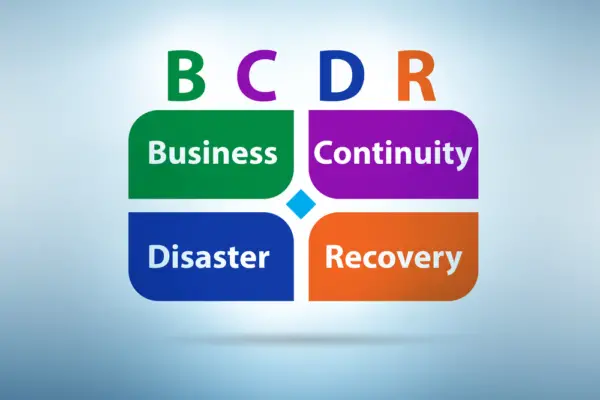Business Continuity Planning (BCP) has several benefits that can help an organization navigate through disruptions while maintaining operations and services. Some of these benefits include:
- Reduction of Operational Downtime: A well-crafted BCP can significantly reduce the time it takes for a business to recover from a disruptive event, ensuring that critical operations can continue with minimal interruption (C2).
- Protection of Brand and Reputation: By demonstrating a proactive approach to dealing with potential crises, a business can maintain customer trust and confidence, which is crucial for long-term success (Deloitte Ireland).
- Regulatory Compliance: Many industries have regulations that require businesses to have a continuity plan in place. By adhering to these regulations, a company can avoid legal penalties and maintain good standing (C2).
- Competitive Advantage: Companies with an effective BCP may have a strategic advantage over competitors who do not have a plan in place, especially in the face of widespread disruptions (Deloitte Ireland).
- Financial Protection: By minimizing the impact of disruptions, a BCP can help protect a company’s financial position, ensuring that it can continue to generate revenue and control costs during a crisis (Smartsheet).
- Stakeholder Assurance: A BCP provides stakeholders, including investors, customers, and employees, with the assurance that the company is well-prepared to handle unforeseen events, which can bolster confidence and support (Deloitte Ireland).
- Employee Safety and Morale: Having a plan in place can ensure employee safety during a disaster and boost morale by providing clear protocols and a sense of security (TechTarget).
This is where business continuity planning comes into play. With a comprehensive plan in place, businesses can weather the storm and emerge stronger than ever.
But what are the benefits of such planning? Stay tuned to discover how businesses can bounce back swiftly from disruptive events and safeguard themselves against cyber attacks, among other advantages.
Key Takeaways
- Business continuity planning ensures the resilience and continuity of business operations, mitigating the impact of unplanned interruptions.
- Implementing a comprehensive plan allows for quick recovery from unexpected events, minimizing downtime and financial losses.
- Regular testing of the plan ensures its effectiveness and the ability to bounce back swiftly after a disruptive event.
- Recognizing the threat of cyber-attacks and ensuring supply chain resilience are crucial aspects of business continuity planning to protect valuable assets and maintain operations.
Introduction
Why is an introduction to business continuity planning important for companies of all sizes?
An introduction to business continuity planning is essential to ensure the resilience and continuity of business operations in the face of unforeseen events or disruptive events.
By implementing an effective business continuity plan, organizations can mitigate the impact of unplanned interruptions, manage risks, and enhance their organizational resilience.
This proactive approach to risk management provides numerous benefits, safeguarding the future of the business.

Definition of business continuity planning
Business continuity planning is the process of creating and implementing strategies and measures to ensure the uninterrupted operation of a business in the event of unexpected disruptions or crises.
It involves developing a robust business continuity plan, which includes a recovery strategy, risk management strategy, communication plan, emergency plan, crisis management, and disaster recovery planning.
The benefits of business continuity planning are numerous, including minimizing downtime, reducing financial losses, maintaining customer trust, and ensuring the overall resilience and sustainability of organizations.
However, it’s important to consider the potential disadvantages of business continuity planning, such as the cost and time required for implementation.
The importance of having a comprehensive plan in place
Having a comprehensive plan in place is crucial for businesses as it enables them to minimize downtime and losses. By ensuring the continuity of critical business functions, companies can reduce the impact of disruptions on operations and revenue.
Additionally, a well-prepared plan allows for quick recovery from unexpected events, enabling businesses to resume normal operations efficiently.
Minimizing Downtime and Losses
A comprehensive plan in place for business continuity is crucial for minimizing downtime and losses.
With a well-designed business continuity plan, organizations can ensure the smooth recovery of critical business functions in the event of disruptions.
This includes conducting a thorough business impact analysis and risk assessment to identify vulnerabilities and prioritize recovery efforts.
Ensuring the continuity of critical business functions
With a well-designed plan in place for business continuity, organizations can ensure the smooth recovery of critical business functions, allowing them to effectively navigate disruptions and maintain operational stability.
This comprehensive approach to continuity planning offers numerous benefits, including minimizing downtime and losses. By ensuring the continuity of critical business functions, organizations can continue to deliver products and services to their customers, maintain their reputation, and protect their bottom line.
A well-executed plan provides a sense of security and confidence, allowing businesses to adapt and thrive in any situation.
| Benefit | Emotional Response |
|---|---|
| Minimizes losses | Relief |
| Maintains reputation | Confidence |
| Protects bottom line | Security |
| Ensures customer satisfaction | Trust |
| Promotes business resilience | Resilience |
Reducing the impact of disruptions on operations and revenue
To reduce the impact of disruptions on operations and revenue, it’s crucial to develop and implement a comprehensive plan. A well-designed business continuity planning can provide several benefits in this regard.
It helps identify critical functions and prioritize their recovery in the event of unforeseen disruptions. By having a clear plan in place, companies can minimize downtime and resume their operational functions more quickly, thereby reducing the financial impact on their revenue.
Quick Recovery from Unexpected Events
Having a comprehensive plan in place is crucial for ensuring a quick recovery from unexpected events and minimizing the financial impact on revenue.
Business continuity planning helps organizations anticipate potential threats and develop strategies to mitigate risks. This includes creating protocols for handling disasters, ensuring the safety of employees and stakeholders, and implementing measures to resume operations swiftly.
Regular testing of the plan ensures its effectiveness and helps identify areas that need improvement, enabling organizations to recover quickly and maintain business continuity.
| Benefits of Business Continuity Planning |
|---|
| Quick recovery from unexpected events |
| Minimizes financial impact on revenue |
| Anticipates potential threats |
| Ensures safety of employees and stakeholders |
| Implements measures to resume operations swiftly |
| Regular testing for plan effectiveness |
Implementing strategies to bounce back swiftly after a disruptive event
Implementing strategies to bounce back swiftly after a disruptive event is crucial for businesses to minimize downtime and resume normal operations as soon as possible.
By having a comprehensive plan in place, companies can protect themselves against natural disasters and other unexpected events that can disrupt their operations.
Developing strategies to mitigate the impact of these events on business operations is essential for ensuring business continuity and minimizing financial losses.
Reducing downtime and resuming normal operations as soon as possible
Businesses can expedite their recovery process and minimize downtime by implementing efficient strategies to swiftly bounce back after a disruptive event.
- Regular testing of the business continuity management system ensures preparedness for potential disruptions.
- Taking a proactive approach to identify and mitigate potential risks helps in maintaining critical operations.
- Timely recovery and resumption of normal operations are advantages of having a well-established business continuity plan in place.
Protection against Natural Disasters
Swiftly recovering after a disruptive event, businesses can implement strategies to protect against natural disasters. As a part of their business continuity planning, they need to develop a comprehensive recovery plan to minimize the damage and loss caused by unexpected events.
Developing strategies to mitigate the impact of these events on business operations
Developing effective strategies to mitigate the impact of disruptive events on business operations is crucial for ensuring swift recovery.
Companies and businesses must be prepared to face various threats that can disrupt their services, such as natural disasters or cyber attacks.
To do so, they need to establish a strong team and effective communication channels.
Additionally, having a well-defined business continuity strategy, including disaster recovery plans and secure supply chains, is essential for bouncing back quickly after such events.
Safeguarding Against Cyber Attacks
Recognizing the growing threat of cyber attacks to businesses, it’s crucial to implement preventive measures and response plans to minimize the potential damage.
This includes investing in robust cybersecurity systems, conducting regular vulnerability assessments, and educating employees on best practices for online security.
Additionally, businesses must also ensure the resilience of their supply chain by working closely with vendors and partners to establish rigorous security protocols.

Recognizing cyber attacks as a major threat to businesses
Businesses must be aware of the significant threat posed by cyber attacks and take proactive measures to safeguard against them.
- Cyber attacks can disrupt business operations and lead to a loss of revenue.
- Recognizing cyber attacks as a major threat allows businesses to prioritize their resources effectively.
- Implementing business continuity planning helps protect valuable assets and ensures a quick recovery from cyber attacks.
Implementing preventive measures and response plans to minimize damage caused by cyber attacks
To minimize the damage caused by cyber attacks, organizations must implement preventive measures and response plans.
The increasing cyber threat landscape poses significant risks to businesses, including financial losses, trust erosion, and supply chain disruptions.
By developing a comprehensive business continuity plan and integrating it into their overall risk management strategy, organizations can ensure prompt and effective responses to cyber attacks.
This proactive approach helps mitigate business interruption and enables swift recovery, safeguarding against potential damages.
Ensuring Supply Chain Resilience
After implementing preventive measures and response plans to minimize damage caused by cyber attacks, organizations can further safeguard against such threats by ensuring the resilience of their supply chains.
This is crucial because any disruption in the supply chain can have a significant impact on the business continuity planning.
To achieve supply chain resilience, organizations should consider the following:
- Establishing strong partnerships with suppliers and regularly assessing their cybersecurity measures.
- Diversifying the supply chain to minimize dependencies on a single source or location.
- Conducting regular risk assessments and implementing appropriate risk mitigation strategies.
Frequently Asked Questions
What Are the Key Elements of a Successful Business Continuity Plan?
The key elements of a successful business continuity plan include identifying critical functions, implementing backup systems, conducting regular training and testing, and establishing communication protocols. These components ensure resilience and minimize disruptions during unexpected events.
How Can Businesses Determine the Potential Risks and Threats They May Face?
Businesses can determine potential risks and threats by conducting a thorough risk assessment. This involves identifying potential hazards, evaluating their likelihood and impact, and developing strategies to mitigate or respond to them.
What Steps Should Be Taken to Ensure Employees Are Adequately Trained in Business Continuity Procedures?
To ensure employees are adequately trained in business continuity procedures, companies should implement comprehensive training programs. These programs should cover the necessary skills and knowledge employees need to handle potential disruptions and effectively carry out their roles during crisis situations.
How Often Should a Business Update and Test Its Business Continuity Plan?
A business should regularly update and test its business continuity plan to ensure its effectiveness. This helps identify any gaps or weaknesses and allows for adjustments to be made, ultimately enhancing the organization’s ability to respond to disruptions.
What Are Some Common Challenges Businesses Face When Implementing and Maintaining a Business Continuity Plan?
Some common challenges businesses face when implementing and maintaining a business continuity plan include lack of employee awareness, difficulty in prioritizing critical functions, and insufficient resources for plan development and testing.

Conclusion
In conclusion, business continuity planning is essential for organizations to effectively respond and recover from disruptive events.
By having a comprehensive plan in place, businesses can minimize downtime, protect their data, and resume operations swiftly.
With the increasing threat of cyber attacks, safeguarding against such risks has become even more critical.
Therefore, implementing strategies to bounce back and ensuring business continuity is crucial for the long-term success and sustainability of any organization.

Chris Ekai is a Risk Management expert with over 10 years of experience in the field. He has a Master’s(MSc) degree in Risk Management from University of Portsmouth and is a CPA and Finance professional. He currently works as a Content Manager at Risk Publishing, writing about Enterprise Risk Management, Business Continuity Management and Project Management.

